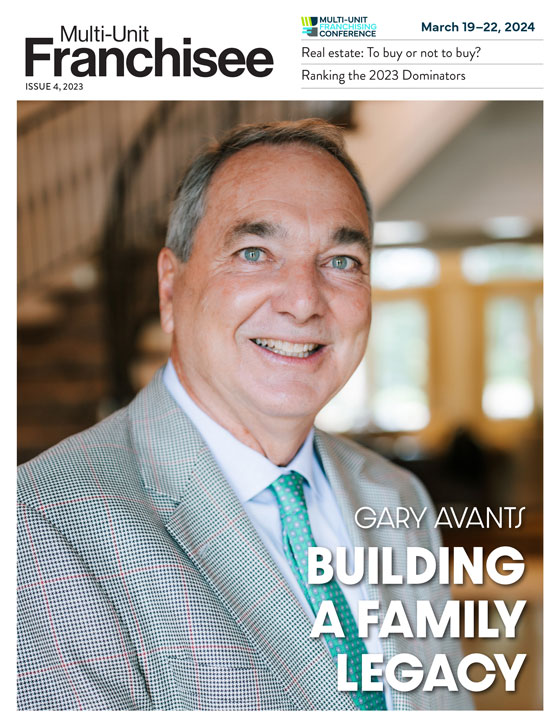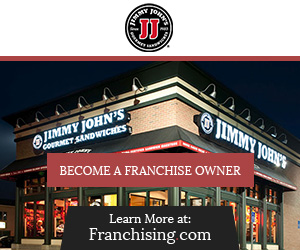Using Real Estate To Achieve Economies of Scale as You Grow

In recent research from the International Journal of Hospitality Management, Kyung A. Sun highlights that one of the key drivers of franchising a business is to achieve economies of scale. This not only boosts product output, it also increases efficiency and amplifies bargaining clout. With this powerful idea in mind, let’s dive deeper into how franchisees can use real estate to realize a similar advantage in their own business.
Unpacking economies of scale
Every franchisee’s dream is to expand their empire, transforming a single unit into a network of thriving outlets. This journey of expansion inevitably intersects with the idea of economies of scale. At its most basic, “economies of scale” is a straightforward concept: It’s the principle that as you produce or purchase more of something, the cost for each individual unit goes down. One soda might cost $1, but buy them in a pack of 20 and each might cost just 75 cents. It’s an elementary principle that has profound implications in the complex realm of franchising and real estate.
Integrating real estate with economies of scale
Real estate, often the most significant investment for a franchisee, directly affects profitability and growth. But how does it intertwine synergistically with economies of scale?
• Strategic centralization. Consider the potential of a centralized system. By choosing locations strategically, franchisees can centralize some of their services. For instance, a centralized kitchen could service multiple nearby restaurant locations, ensuring consistency in quality and reducing production costs. Similarly, a centralized warehouse could distribute stock to retail franchises in a region. By spreading the cost of these centralized services across multiple outlets, the cost per outlet decreases.
• Strength in numbers. A more substantial franchise presence means more significant bargaining power. Franchisees looking to open multiple locations can negotiate deals with property developers for several units at once, possibly obtaining discounted rates or better lease terms. By securing multiple locations under a single negotiation, you’re essentially “buying in bulk.” And just as in our soda analogy, you might get a better deal.
• Replicability. Once you’ve successfully launched a unit with a working model, the real estate strategy can be replicated across different locations. The design, layout, contracts, and even service blueprints can be reused, saving on design and legal costs for subsequent outlets.
The how of making it happen
Now that the what and the why are clear, let’s navigate to the how. Successful franchising leans heavily on understanding local dynamics and adapting accordingly. This means comprehensive studies into:
Demographics. What is the age group predominating in the area? Young professionals might be drawn to quick service or tech-integrated outlets, while families might prefer sit-down restaurants or entertainment hubs.
Psychographics. Beyond age and income, what are the interests, habits, and activities of your target market? A community heavily invested in fitness might welcome health-oriented food franchises.
Economic indicators. Is the local economy growing, stable, or declining? A booming economy might mean more disposable income, making it ripe for luxury or niche franchises.
Digital bottlenecks. With the rise of apps and the increasing desire for an interaction-free experience, can your real estate support new tech or integrate with popular delivery platforms?
Space dynamics. As the concept of ghost kitchens (kitchens that primarily serve delivery orders) gains traction, does the space allow for this kind of restructuring?
From conceptualization to action
History, especially in the business world, offers a treasure trove of lessons. While the Starbucks of the world provide insights into masterfully leveraging real estate for brand dominance, there are countless “Blockbuster-esque” examples of ventures that expanded too rapidly without adequate market research or that fell short of adapting to new norms and faced setbacks. So, armed with a deeper understanding, it’s time to put theory into practice.
1) Initiate in-depth research. To understand potential markets, engage in both qualitative (surveys, focus groups) and quantitative (demographic studies, sales data) research.
2) Forge connections. Networking isn’t just about growth; it’s about learning. Connect with existing franchisees and industry experts. More importantly, connect with the communities in your prospective markets. Understand their needs and preferences. This not only ensures a loyal customer base, but can lead to local partnerships that reduce operational costs.
3) Start small. Diving into the deep end is a choice, and it’s rarely a smart one. Before making a major investment in a new market, consider testing the waters with a pop-up shop or a short-term lease.
Takeaways
Remember, as a franchisee, real estate is more than just a physical space to operate in. It’s an asset, a tool, and a strategy. By intertwining real estate decisions with your scaling objectives, you can truly harness the power of economies of scale, growing not just in size, but in strength and resilience.
Jason Fefer is an associate director of Marcus & Millichap’s Net Leased Property Group on a large team alongside his partners Robert Narchi and Tyler Bindi. They structure sale-leasebacks and negotiate leases on behalf of some of the largest franchisees across all sectors including the restaurant, automotive, and retail space. He can be reached at 818-669-2388 or [email protected].
Share this Feature
Recommended Reading:
FRANCHISE TOPICS
- Multi-Unit Franchising
- Get Started in Franchising
- Franchise Growth
- Franchise Operations
- Open New Units
- Franchise Leadership
- Franchise Marketing
- Technology
- Franchise Law
- Franchise Awards
- Franchise Rankings
- Franchise Trends
- Franchise Development
- Featured Franchise Stories
FEATURED IN

Multi-Unit Franchisee Magazine: Issue 4, 2023

$300,000





 The multi-unit franchise opportunities listed above are not related to or endorsed by Multi-Unit Franchisee or Franchise Update Media Group. We are not engaged in, supporting, or endorsing any specific franchise, business opportunity, company or individual. No statement in this site is to be construed as a recommendation. We encourage prospective franchise buyers to perform extensive due diligence when considering a franchise opportunity.
The multi-unit franchise opportunities listed above are not related to or endorsed by Multi-Unit Franchisee or Franchise Update Media Group. We are not engaged in, supporting, or endorsing any specific franchise, business opportunity, company or individual. No statement in this site is to be construed as a recommendation. We encourage prospective franchise buyers to perform extensive due diligence when considering a franchise opportunity.